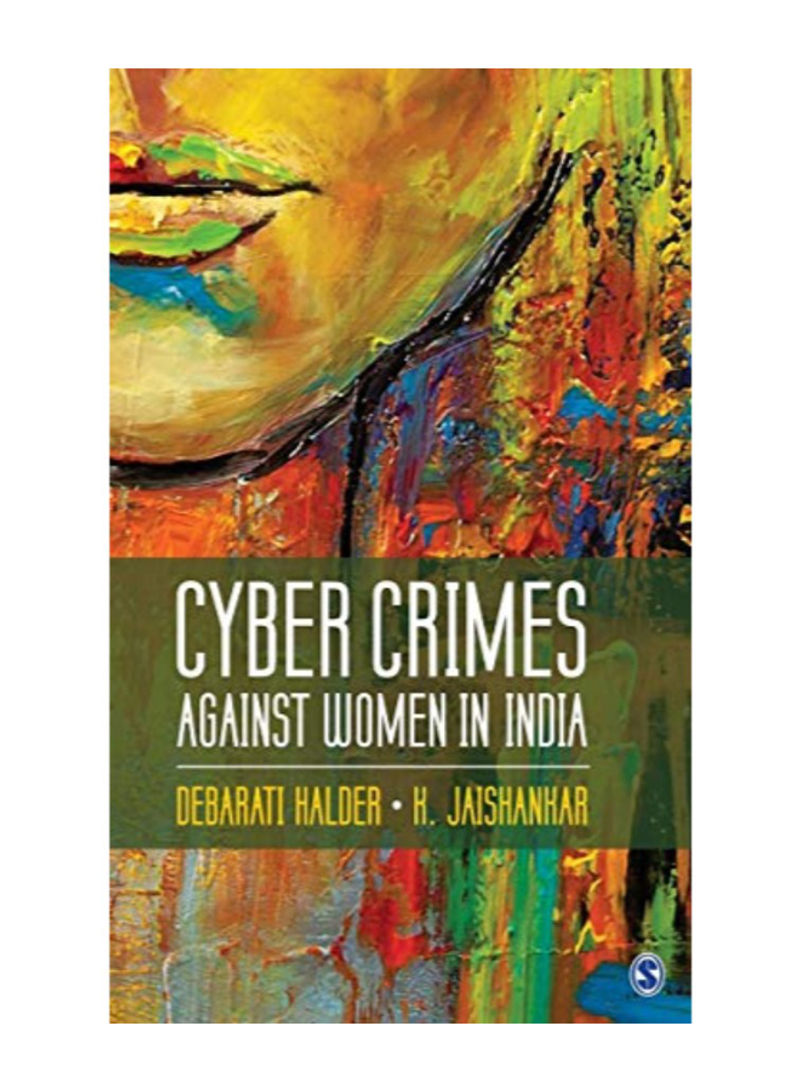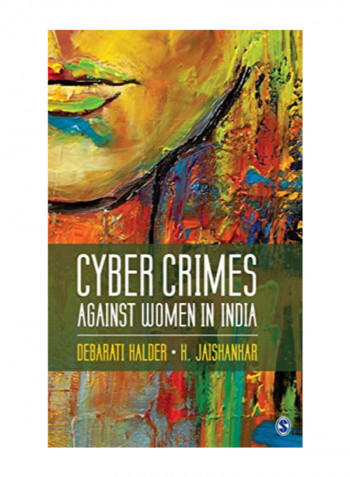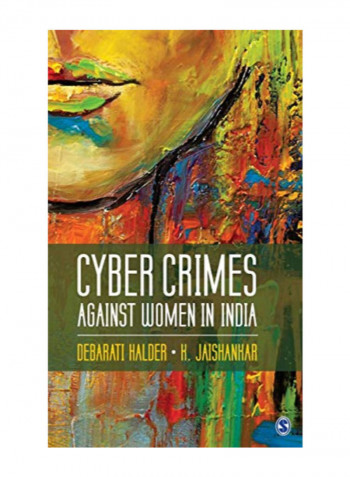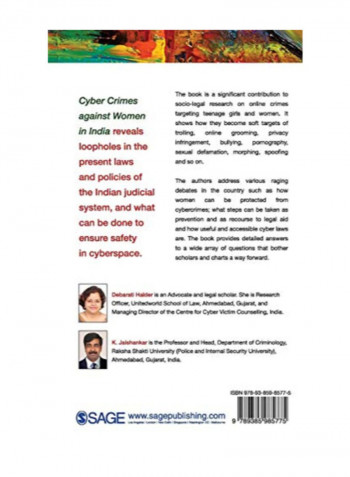Cyber Crimes Against Women In India Hardcover English by Debharathi Halder - November
Recommend
Sort by
Rating
Date
Specifications
Author 1
Debharathi Halder
Book Description
Cyber Crimes against Women in India reveals loopholes in the present laws and policies of the Indian judicial system and what can be done to ensure safety in cyberspace.The book is a significant contribution to socio-legal research on online crimes targeting teenage girls and women. It shows how they become soft targets of trolling, online grooming, privacy infringement, bullying, pornography, sexual defamation, morphing and so on. The authors address various raging debates in the country such as how women can be protected from cybercrimes; what steps can be taken as prevention and as recourse to legal aid and how useful and accessible cyber laws are. The book provides detailed answers to a wide array of questions that bother scholars and charts a way forward.
ISBN-13
9789385985775
Language
English
Publisher
Sage Publisher
Publication Date
November
Number of Pages
272
About the Author
Dr Debarati Halder is an Advocate and legal scholar. Currently, she is Research Officer, United world School of Law, Ahmedabad, Gujarat and Managing Director of the Centre for Cyber Victim Counselling (CCVC), India. She received her LLB from the University of Calcutta and her master’s degree in international and constitutional law is from the University of Madras. She holds a PhD degree from the National Law School of India University (NLSIU), Bangalore, India. She has co-authored a book titled Cyber Crime and the Victimization of Women: Laws, Rights and Regulations (IGI Global, July 2011). She has published many articles in peer-reviewed journals and chapters in peer-reviewed books. Her work has appeared in scholarly journals, including the British Journal of Criminology, Journal of Law and Religion, Victims and Offenders; Murdoch University E-Journal of Law; ERCES Online Quarterly Review; TMC Academic Journal (Singapore); Temida and Indian Journal of Criminology and Criminalistics; And edited volumes, Crimes of the Internet, Trends and Issues of Victimology, Cyber Criminology. She has presented her research works at many international conferences including the Stockholm Criminology Symposium held during 11–13 June 2012 and the International Conference on Social Media for Good, held during 15–16 May 2015 at Istanbul, Turkey. She was a resource person in various programmes conducted by the National Commission for Women, unicef, Facebook, Kerala State Commission for Protection of Child Rights, Rajiv Gandhi National Institute for Youth Development, Women Christian College (Kolkata and Chennai), Loyola College, North Eastern Police Academy, Assam State Commission for Protection of Child Rights and Manonmaniam Sundaranar University, Tirunelveli. Debarati’s research interests include constitutional law, international law, victim rights, cyber crimes and laws. Professor K. Jaishankar is presently the Professor of Criminology and Head of the Department of Criminology at the Raksha Shakti University (Police and Internal Security University), Ahmedabad, Gujarat, India. Prior to this present position, he served as a faculty member at the Department of Criminology and Criminal Justice, Manonmaniam Sundaranar University, Tirunelveli, Tamil Nadu, India. He has published more than hundred publications, including articles, books, book chapters and editorials. He is the recipient of the prestigious National Academy of Sciences, India (NASI) SCOPUS Young Scientist Award 2012–Social Sciences and ISC – S. S. Srivastava Award for Excellence in Teaching and Research in Criminology. He was a Commonwealth Fellow (2009–2010) at the Centre for Criminal Justice Studies, School of Law, University of Leeds, UK and has completed a research project on victims of cyber crimes. He is the founding Editor-in-Chief of the International Journal of Cyber Criminology and Editor-in-Chief of International Journal of Criminal Justice Sciences . He is the founding President of the South Asian Society of Criminology and Victimology (SASCV) and founding Executive Director (Honorary) of the Centre for Cyber Victim Counselling (CCVC). He was a member of the UNODC (United Nations Office of Drugs and Crime) Core Group of Experts on Identity-related Crime (2007–08). He is a member of the Membership and Advancement Committee, World Society of Victimology (WSV); International Advisory Board for the Center for the Research and Development of Positive Criminology, Department of Criminology, Bar Illan University, Israel; Advisory Board for the Center for Cybercrime Studies, John Jay College of Criminal Justice, New York, USA; the International Cybercrime Research Centre, Simon Frazer University, Vancouver, Canada; And the Scientific Commission of the International Society of Criminology (ISC). He was a Keynote Speaker at the 15th World Society of Victimology Symposium held in July 2015, at Perth, Australia and at the 14th World Society of Victimology Symposium held in May 2012 at The Hague, The Netherlands. He was recently appointed as an International Ambassador of the British Society of Criminology (BSC). He is founder of the academic discipline, Cyber Criminology (2007) and is the proponent of the Space Transition Theory of Cyber Crimes (2008). His areas of Academic Competence are victimology, cyber criminology, crime mapping, GIS, communal violence, policing and crime prevention.
Author 2
H . Jaishanhar
Editorial Review
The strength of this book lies in its attempt to expand the terms of the discourse on cybercrimes against women within the Indian context where conservative attitudes and the all-important demand on women to appear pure and chaste makes prurient exposure in the cyber space particularly destructive of their sense of self and ability to live a normal life. While the authors recognize this reality and argue for the need to transform mindsets, including through school and college education, they are clearly more comfortable with a legalistic, criminologist framework in addressing such deviant behavior, rather than by adopting a sound feminist approach.[The book] makes a useful contribution to contemporary debates on digital communications by examining cybercrimes and offences against girls and women in India. Crimes against women in the digital spaces have prompted wide discussions in the popular media, but scholarship on legal and policy issues is still evolving. The book comes as a timely contribution to address some of these gaps. It offers a good entry point with a detailed sociologic analysis of cyber offences against women… [The book] is commendable for offering a broad picture of the legal and institutional limitations as well as policy directions to address cybercrime against women in digital India.




